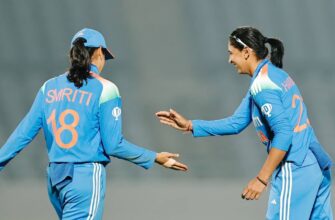In the high-octane world of professional cricket, where every ball bowled and every run scored is dissected under an intense public gaze, the line between critical analysis and outright personal attack has become increasingly blurred. This challenging dynamic recently took center stage as two of Indian cricket’s most articulate voices, Ravichandran Ashwin and Gautam Gambhir, independently but emphatically called for a return to civility and ethical boundaries in public discourse surrounding players.
The Crucible of Selection: Harshit Rana and the Online Storm
The immediate catalyst for this crucial conversation was the selection of young pacer Harshit Rana for the Indian team’s ODI series against Australia. Such selections invariably spark debate, and Rana’s inclusion was no exception. Initial skepticism, even from seasoned observers like Ashwin himself, quickly morphed into a more aggressive online narrative. This narrative, however, veered sharply from questioning cricketing merit to what many perceived as `below-the-belt` personal attacks.
It was against this backdrop that India head coach Gautam Gambhir, a man known for his fiery on-field demeanor but also his clear-headed perspectives off it, first lashed out. His target: veteran cricketer Krishnamachari Srikkanth, who had allegedly labeled Rana a `constant yes man` – a critique that Gambhir found crossing an unacceptable line into personal disparagement.
Ashwin`s Powerful Pivot: From Critic to Defender
What followed was a significant pivot from Ravichandran Ashwin. Having initially raised questions about Rana`s selection, Ashwin subsequently aligned with Gambhir’s stance, shifting his focus from the merits of selection to the ethics of criticism. Speaking on his popular YouTube channel, Ashwin articulated a principle that resonated deeply: there can be no place for `below the belt` or `personal` attacks in sports commentary.
“I have always reiterated that no player should be attacked below the belt. When the attack becomes too personal, the genre changes. What they say might be right or wrong, as long as the criticism doesn`t get personal, I am fine with it.” – Ravichandran Ashwin.
Ashwin even cited his own career-long experience with commentator Sanjay Manjrekar, noting how, despite consistent criticism, he held no grudge because the comments remained professional, focusing on his game, not his character. This distinction, between scrutinizing skill and denigrating an individual, is the very bedrock of respectful sporting dialogue.
The Invisible Scars: Mental Health in the Digital Age
The seasoned off-spinner delved further into the profound psychological impact of unchecked online negativity. He painted a poignant picture: a young player like Harshit Rana, on the cusp of representing his nation, encountering a barrage of harsh, personal criticism. “Assume Harshit sees the reel in which he is being harshly criticised, and he is about to play a match for India, wouldn`t he be shattered by this?” Ashwin questioned, highlighting the vulnerability of athletes, particularly new entrants.
The ripple effect extends beyond the player to their families and friends, who bear the emotional brunt of public vilification. This is where Ashwin identified a critical flaw in modern fan culture: the demand for negativity. “Negativity sells these days. They sell whatever is in demand. We should avoid consuming such content,” he urged, placing a share of the responsibility on the audience to choose constructive engagement over destructive sensationalism.
The Cycle of Scorn and Celebration: A Touch of Irony
Perhaps with a touch of weary irony, Ashwin also challenged the fickle nature of online sentiment. He posed a direct question to the collective, scrutinizing current trends: “Everyone`s targeting Harshit Rana left, right and centre. Let me ask you one thing: if the same Harshit performs well next year, will the same people put him on the same pedestal and celebrate him?”
This observation underscores a prevalent hypocrisy, where players are mercilessly torn down for perceived failures only to be elevated as heroes upon success, often by the very same voices. It serves as a stark reminder that genuine support should transcend transient performance, fostering an environment where growth and resilience are prioritized over instant gratification and condemnation.
A Plea for Principled Discourse
Ashwin`s impassioned plea culminates in a call for a more principled approach to sports commentary and fandom. His message is clear: respect the game, respect the player, and understand the difference between analyzing a performance and attacking a person. In an era dominated by instantaneous reactions and unfiltered opinions, the voices of cricketers like Ashwin and Gambhir serve as crucial reminders that while criticism is part of the game, humanity and empathy must always remain at its core. The true spirit of cricket, after all, thrives not just on fierce competition but also on mutual respect, both on and off the field.









